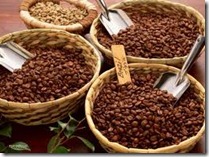A lot of Vietnamese coffee exporters have to purchase coffee from foreign businessmen to fulfill export contracts. The purchase prices are even higher than the export prices. The problem is that Vietnamese exporters have signed the contracts on exporting coffee, but they cannot collect coffee from farmers to fulfill the orders, because only 10 percent of the total crop output has been left among farmers. As a result, exporters have to purchase coffee from foreign businessmen at exorbitant high prices.
It is expected that farmers now keep only 100,000 tons of coffee; therefore, export companies should rely on the collection from farmers to fulfill the export contracts. Meanwhile, foreign companies are offering to sell coffee to Vietnamese companies which they know are thirsty for materials to fulfill the export contracts.
According to the Vietnam Coffee and Cocoa Association (Vicofa), the inventory level at bonded warehouses and private own warehouses of foreign companies has reached 200,000 tons. It would be better for them to sell coffee prices to Vietnamese partners for good prices, than carrying goods to the warehouses in Europe and North America and selling to the partners on London’s trading floor.
Also according to Vicofa, export companies are struggling with the high lending interest rates, while they still have many export contracts to fulfill. The association has warned that the companies which cannot struggle to survive the current difficulties until the next crop may go bankrupt.
Therefore, most of coffee companies are thirsty for materials, while the new crop will only begin in October.
According to the Ministry of Agriculture and Rural Development MARD, Vietnam exported 115,000 tons of coffee in June 2011, worth 250 million dollars, raising the total export volume to 913,000 tons in the first six months of 2011. With the exports, which represent the increase of 38.6 percent in comparison with the same period of the last year, Vietnam earned 1.93 billion dollars in export turnover.
Though the coffee prices remain at high levels, the coffee market has shown instability since June 2011, with prices up and down all the time.
The coffee price dropped sharply in early June. On June 6, the coffee price plunged by four percent just within a day, turning coffee into the item which had the sharpest price decrease among 24 raw products. Foreign newspapers used the word “tsunami” when reporting the sacrifice of robusta coffee amid the news that the coffee output in Brazil increases by 25 percent thanks to the good weather.
In the second week, the coffee price recovered significantly. However, in late June, the price once again, dropped to the 3-month deepest low thanks to the profuse supply.
However, the coffee price increased once again in the first week of July. In London, the robusta coffee with delivery in September has increased by one percent to 2498 dollars per ton. The one percent increase would be considered a normal thing. However, it is really a remarkable thing that a very high trading volume has been reported: 60,000 lots, four times higher than the trading volume of the previous trading session, which shows investors’ worries about the supply.
In the domestic market, the coffee price, after making a new record of 51,600 dong per kilo on June 1, began decreasing sharply to 48.6 million dong per ton by mid June. The demand for robusta coffee became weaker, and investors rushed to purchase arabica with the worries about the lack of high quality supply from Kenya. Meanwhile, Vietnam mainly provides robusta coffee.
The situation became different in early July 2011–the domestic price increased significantly to 51,000 dong per kilo. However, after that the coffee price in the Central Highlands late last week dropped by 400,000 dong per ton to 50.7 million dong per ton.
Vietnam has 150 coffee export companies, while the majority of exports have been handled by 20 biggest companies. Vietnam is exporting coffee to 80 markets, including the US, Germany, Spain, Italia and Japan.
http://www.export.vn/index.php?option=com_content&task=view&id=10915&Itemid=27


Deprecated: strpos(): Passing null to parameter #1 ($haystack) of type string is deprecated in /home/agriviek8Qv/agriviet.net/public_html/wp-includes/comment-template.php on line 2522